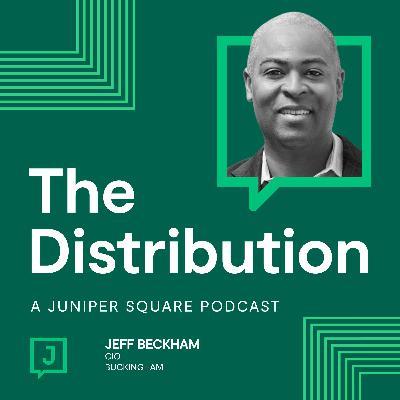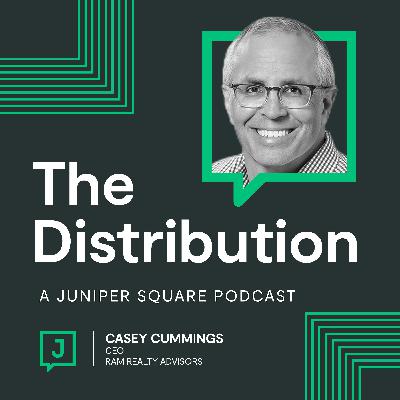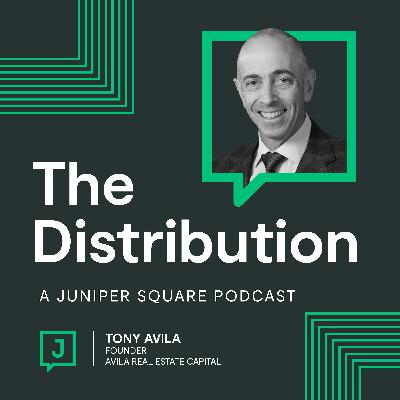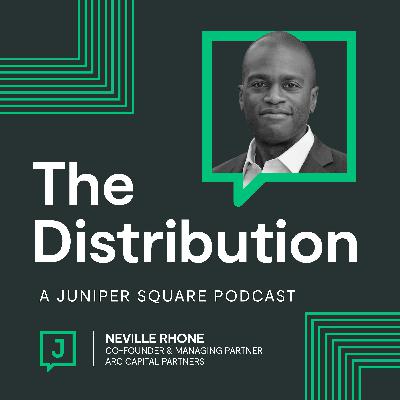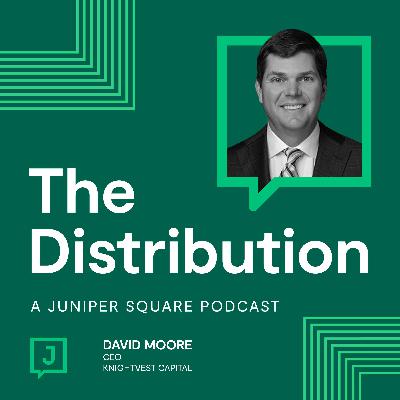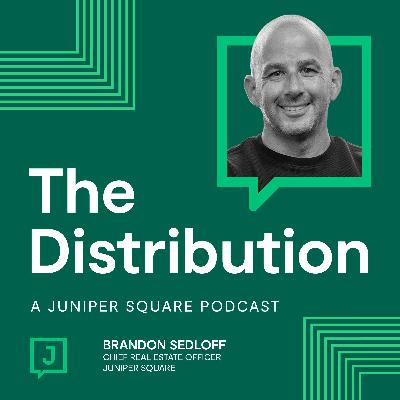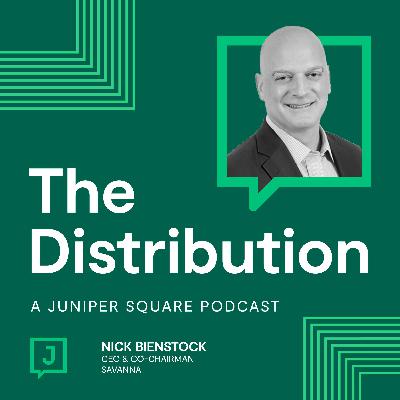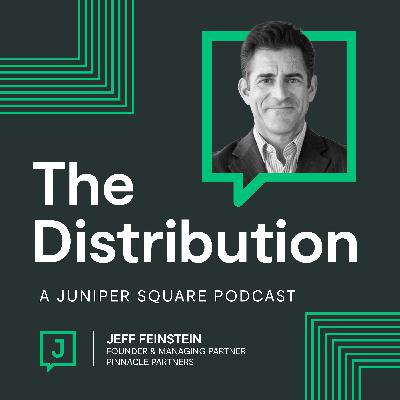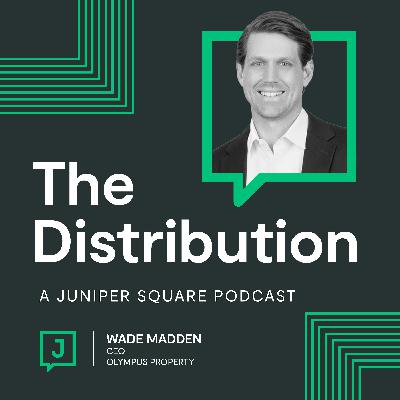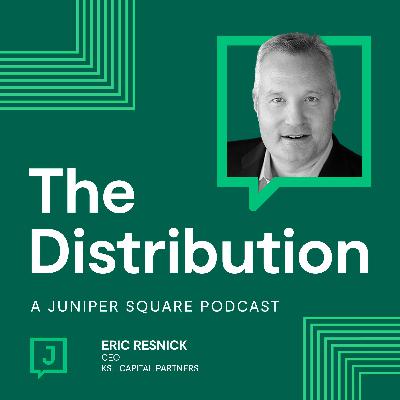Discover The Distribution by Juniper Square
The Distribution by Juniper Square

The Distribution by Juniper Square
Author: Juniper Square
Subscribed: 10Played: 340Subscribe
Share
© Copyright 2025
Description
The Distribution by Juniper Square sits you down with industry experts, thought leaders, and some of the biggest names in commercial real estate, venture capital, and private equity, for open and honest conversations about what’s happening in the private markets.
111 Episodes
Reverse
In this episode of The Distribution, Brandon Sedloff sits down with Phil Huber to unpack the evolution of private markets and their growing role in private wealth portfolios. Phil shares his path from a family RIA to leading portfolio solutions at Cliffwater, and explains why alternatives are shifting from a niche allocation to a core portfolio decision. The conversation explores how interval funds, multi-manager strategies, and improved liquidity frameworks are reshaping access to private equity and private credit for advisors. Along the way, Phil offers a clear, practical lens on education, structure, and risk management in an increasingly complex alternatives landscape.
They discuss:
Phil’s career journey from wealth management to asset management and his focus on alternatives
Why private markets are becoming an active allocation decision rather than an institutional afterthought
How interval funds work, including liquidity mechanics, eligibility, and portfolio fit
The role of multi manager and co investment strategies in diversification and fee efficiency
What advisors and CIOs look for when evaluating private market products for client portfolios
Links:
Phil on LinkedIn - https://www.linkedin.com/in/phil-huber/
Cliffwater - https://cliffwater.com/
Brandon on LinkedIn - https://www.linkedin.com/in/bsedloff/
Juniper Square - https://www.junipersquare.com/
Topics:
(00:00:00) - Intro
(00:04:32) - Phil Huber's early career and family influence
(00:10:52) - Transition to Cliffwater and focus on alternatives
(00:12:06) - Understanding private markets and co-investments
(00:25:57) - Cliffwater's funds and direct lending strategy
(00:28:01) - Cliffwater's view on direct lending
(00:30:28) - Challenges of traditional private market investments
(00:33:14) - Advantages of interval funds
(00:34:32) - Liquidity management in interval funds
(00:41:39) - Multi-manager vs. single manager strategies
(00:45:09) - Real assets and interval funds
(00:48:18) - Daily beta adjustments for private assets
(00:50:01) - Educating advisors and clients
(00:53:56) - Future trends in private markets
(00:56:07) - Conclusion and final thoughts
In this episode of The Distribution, Brandon Sedloff sits down with Jahan Moslehi to explore the long arc of building a retail real estate platform rooted in relationships, conviction, and operational discipline. Jahan shares his journey from immigrating to the US as a child to founding Bridge33 Capital, detailing how mentorship, trust, and hands-on execution shaped the firm’s growth. The conversation traces Bridge33’s evolution from its very first deal to a national portfolio, while unpacking why retail has proven far more resilient and misunderstood than many investors assume. Along the way, Jahan offers a candid look at scale, tenant relationships, and the realities of operating through multiple market cycles.
They discuss:
• How Bridge33 Capital was built from a single, highly challenged first deal into a national retail platform
• Why retail real estate is fundamentally a relationship-driven business and how scale changes competitive dynamics
• Lessons learned from mentorship, early conviction, and making decisions with imperfect information
• The operational intensity of retail and why hands-on ownership matters more than financial engineering
• Common misconceptions about retail and why select retailers and open-air centers continue to thrive
Links:
Jahan on LinkedIn - https://www.linkedin.com/in/jahan-moslehi-5ba04017/
Bridge33 Capital - https://www.bridge33capital.com/
Brandon on LinkedIn - https://www.linkedin.com/in/bsedloff/
Juniper Square - https://www.junipersquare.com/
Topics:
(00:00:00) - Intro
(00:03:22) - Jahan's early life and immigration story
(00:04:44) - Academic journey and career shift
(00:06:43) - Entering the real estate sector
(00:08:45) - Founding Bridge33 Capital
(00:09:37) - Challenges and early successes
(00:29:01) - Unexpected success with leasing
(00:32:54) - Building Bridge33's portfolio
(00:38:13) - Expanding and raising funds
(00:46:31) - The importance of relationships in retail
(00:52:32) - Future of Bridge33 and retail insights
In this episode of The Distribution, Brandon Sedloff sits down with Chris Schelling for a deep dive into the evolving intersection of private markets, alternatives, and private wealth. Chris shares his unconventional path into investing, from studying psychology to becoming a longtime allocator and advisor across institutional and wealth channels. The conversation explores how private markets have matured, why education remains a critical gap in the wealth space, and what it really takes to allocate capital effectively in opaque and complex markets. Drawing on decades of experience meeting thousands of managers, Chris offers a clear-eyed perspective on risk, return dispersion, and the structural shifts reshaping private capital.
They discuss:
How psychology, behavior, and incentives shape decision-making in private markets
The growing role of private wealth in alternatives and why institutional playbooks still matter
Risks like adverse selection, return dispersion, and misaligned incentives in private investments
Interval funds and why they can be effective tools for accessing private markets at scale
Chris’s outlook on private equity, private credit, hedge funds, venture, and real assets over the next two years
Links:
Aksia - https://www.aksia.com/
Chris on LinkedIn - https://www.linkedin.com/in/christopher-schelling/
Brandon on LinkedIn - https://www.linkedin.com/in/bsedloff/
Juniper Square - https://www.junipersquare.com/
Topics:
(00:00:00) - Intro
(00:03:12) - Chris’ background and career
(00:05:33) - The intersection of psychology and finance
(00:07:30) - Understanding capital markets and alternatives
(00:16:49) - The role of private markets in portfolios
(00:31:15) - Understanding interval funds
(00:32:36) - Managing risks and liquidity
(00:34:01) - Challenges and strategies in fund management
(00:35:25) - The importance of education in wealth management
(00:37:33) - Adapting to market trends and client needs
(00:39:55) - The role of large asset managers
(00:43:43) - Private markets and wealth management
(00:49:11) - Evaluating general partners (GPs)
(00:52:35) - Current trends in alternative investments
(01:00:23) - Conclusion and contact information
In this episode, Brandon Sedloff sits down with Willy Walker for a conversation on leadership, capital markets, and the evolution of Walker & Dunlop. Willy walks through his unconventional path into real estate, from early career experiences in Latin America to returning home to help scale a multi-generational family business. The discussion explores how personal ambition, insecurity, and long-term vision shaped both his leadership style and the firm’s growth into a publicly traded platform. Together, they also unpack current dynamics in multifamily, capital flows, and the role of media and personal platforms in building trust and credibility in the industry.
They discuss:
• Willy Walker’s career journey from nonprofit work and private equity to leading Walker & Dunlop
• Lessons from scaling a family-owned company into a public, diversified real estate platform
• How public market expectations changed strategic planning and capital allocation decisions
• The state of multifamily in 2025, including supply, rent trends, and capital flows
• The origins and impact of the Walker Webcast as a long-term communication and trust-building tool
Links:
Willy on LinkedIn - https://www.linkedin.com/in/willy-walker/
The Walker Webcast on YouTube - https://www.youtube.com/playlist?list=PL_QkMqEzOkzNmWUe9kpfRJ4213jIh6LNk
Brandon on LinkedIn - https://www.linkedin.com/in/bsedloff/
Juniper Square - https://www.junipersquare.com/
Topics:
(00:00:00) - Intro
(00:03:29) - Willy’s career journey
(00:18:44) - Leadership and business growth
(00:34:03) - Post-financial crisis IPO challenges
(00:37:38) - Diversification strategy
(00:41:56) - Investment management business evolution
(00:47:29) - Multifamily market trends in 2025
(00:53:33) - Capital flows and market dynamics
(01:01:29) - Building a personal brand with Walker webcast
(01:08:20) - Conclusion and final thoughts
In this episode of The Distribution, Brandon Sedloff sits down with Jeff Beckham to discuss building institutional real estate platforms, generating operational alpha, and scaling founder-led investment firms. Jeff walks through his career from investment banking to global real estate investing and explains how those experiences shaped his approach as Chief Investment Officer at Buckingham. The discussion dives deep into Buckingham’s focus on the living sector, vertical integration, and why discipline and process matter most in today’s market environment.
They discuss:
• Jeff’s career path from Morgan Stanley to leading investment platforms across Europe and the US
• Why Buckingham focuses exclusively on the living sector across multifamily, student housing, build-to-rent, and active adult
• How vertical integration across development, construction, and property management drives operational alpha
• The investment case for Midwest, Southeast, and Mountain West markets versus coastal markets
• Balancing entrepreneurial deal-making with institutional processes, accountability, and scale
Links:
Buckingham Companies - https://buckingham.com/
Jeff on LinkedIn - https://www.linkedin.com/in/w-jeffrey-beckham-2ab2712/
Brandon on LinkedIn - https://www.linkedin.com/in/bsedloff/
Juniper Square - https://www.junipersquare.com/
Topics:
(00:00:00) - Intro
(00:04:54) - Jeff's career journey
(00:12:20) - Joining Buckingham and real estate insights
(00:19:51) - Buckingham's investment strategy
(00:28:45) - The appeal of build-to-rent (BTR) housing
(00:29:43) - Investment strategies in the living sector
(00:31:18) - Challenges and opportunities in the living sector
(00:35:47) - Operational focus and deal sourcing
(00:38:57) - Role and responsibilities of a CIO
(00:44:09) - Building systems for future growth
(00:46:37) - Balancing immediate and long-term goals
(00:52:29) - Excitement for future opportunities
(00:53:55) - Conclusion and contact information
In this episode of The Distribution, Brandon Sedloff sits down with Casey Cummings for a deep conversation on building a real estate investment firm over multiple decades and market cycles. Casey walks through his personal path into the business, the evolution of Ram Realty Advisors, and the strategic decisions that shaped its transition from family capital to institutional platforms. The discussion spans multifamily and grocery-anchored retail, with a strong focus on operational discipline, local market knowledge, and long-term capital alignment. Together, they explore how staying focused by geography and asset type has driven both growth and resilience.
They discuss:
Casey’s early career lessons and how hands-on operating experience shaped his leadership style
The evolution of Ram Realty Advisors from family-backed projects to institutionally structured funds
Why deep local market knowledge and on-the-ground decision-making create a competitive edge
The differences in risk, supply, and opportunity across multifamily and grocery-anchored retail
How Casey evaluates current macro uncertainty and positions the portfolio for unknown risks
Links:
Ram Realty Advisors - https://www.ramrealestate.com/
Casey on LinkedIn - https://www.linkedin.com/in/casey-cummings-16a618119/
Brandon on LinkedIn - https://www.linkedin.com/in/bsedloff/
Juniper Square - https://www.junipersquare.com/
Topics:
(00:00:00) - Intro
(00:01:43) - Casey Cummings' background and early career
(00:06:24) - Building and expanding Ram Realty Advisors
(00:13:19) - Strategic decisions and institutional growth
(00:21:39) - Current operations and business model
(00:27:59) - Dodging bullets in real estate
(00:28:36) - Evolution of project quality
(00:29:55) - On-the-ground insights
(00:34:28) - Balancing institutional structure and creativity
(00:35:12) - Organizing acquisition teams
(00:37:26) - Multifamily portfolio overview
(00:38:47) - Grocery-anchored retail explained
(00:44:21) - Future opportunities and challenges
(00:44:51) - Macro-level economic conflicts
(00:48:20) - Retail and multifamily market dynamics
(00:53:28) - Biggest risks and concerns
(00:56:20) - Conclusion and final thoughts
In this episode of The Distribution, Brandon Sedloff sits down with Tony Avila for a detailed discussion on the evolution of residential land development and homebuilding finance. Tony walks through his multi-decade career, from early exposure to real estate and investment banking to building platforms focused on capital solutions for developers and regional homebuilders. The conversation explores how institutional capital, regulatory shifts, and interest rate cycles have reshaped the housing ecosystem, and why today’s environment presents a distinct opportunity in land and construction lending. Together, they break down the mechanics behind land development loans, underwriting discipline, and the structural gaps left by traditional banks.
They discuss:
• Tony Avila’s career path through real estate workouts, investment banking, and homebuilding M&A
• The institutionalization of homebuilding and the role of public markets and consolidation
• Distressed land and development opportunities following the financial crisis
• Why banks have pulled back from land and construction lending and how private capital is filling the gap
• The fundamentals of land development loans, underwriting risk, and housing affordability
Links:
Tony on LinkedIn - https://www.linkedin.com/in/tony-avila-8879487/
Avila Real Estate Capital - https://www.avilacapllc.com/
Brandon on LinkedIn - https://www.linkedin.com/in/bsedloff/
Juniper Square - https://www.junipersquare.com/
Topics:
(00:00:00) - Intro
(00:01:41) - Tony Avila's background and career
(00:06:03) - The evolution of home building and institutionalization
(00:08:46) - Mergers, acquisitions, and public listings
(00:12:39) - Encore and distressed market opportunities
(00:17:41) - Pivoting strategies in a changing market
(00:20:01) - Current business structure and focus
(00:24:58) - Understanding the fundamentals and opportunities
(00:27:14) - Understanding land development loans
(00:28:54) - Key considerations for land loans
(00:30:43) - Distinguishing developers from builders
(00:32:21) - Funding and underwriting strategies
(00:39:35) - Navigating institutional capital
(00:48:55) - Addressing housing affordability
(00:53:16) - Conclusion and contact information
Neville Rhone joins host Brandon Sedloff on The Distribution for a thoughtful conversation about his path from engineering to real estate, the experiences that shaped his investment philosophy, and the evolution of Arc Capital Partners. He reflects on early lessons from Morgan Stanley and Canyon Partners, the formation of Arc, and why the middle market remains the most compelling area for generating durable returns. Neville also breaks down today’s capital-constrained environment, the structural challenges facing owners, and how Arc is positioning itself as a solution provider during a period of dislocation. The discussion closes with a look at where he sees the greatest opportunities ahead and what GPs should know before reaching out.
They discuss:
• Neville’s early influences and shift from engineering into real estate
• Key takeaways from roles at Morgan Stanley and Canyon Partners
• The founding of Arc Capital Partners and the firm’s middle-market focus
• How today’s capital crisis is creating opportunities for structured solutions
• The sectors and geographies Arc is prioritizing over the next several years
Links:
Neville on LinkedIn - https://www.linkedin.com/in/neville-rhone-jr-60936a3/
Arc Capital Partners - https://arccapitalpartners.com/
Brandon on LinkedIn - https://www.linkedin.com/in/bsedloff/
Juniper Square - https://www.junipersquare.com/
Topics:
(00:00:00) - Intro
(00:02:09) - Neville's background and career
(00:13:07) - Joining Canyon Partners
(00:19:26) - Founding Arc Capital Partners
(00:23:19) - Early challenges and successes
(00:27:52) - The importance of investing during difficult times
(00:29:55) - Current state and future of Arc Capital
(00:32:25) - Navigating capital crises
(00:33:11) - Advice for aspiring institutional capital raisers
(00:35:44) - Opportunities in the middle market
(00:39:49) - Arc Capital's investment focus
(00:47:19) - Future opportunities and focus areas
(00:53:46) - Conclusion and contact information
David Moore joins Brandon Sedloff on The Distribution for a candid conversation about his unconventional path into real estate, the early grind of building Knightvest, and how his team has scaled into one of the country’s most active multifamily owner operators. He reflects on growing up in an entrepreneurial household, navigating early career uncertainty, and stumbling into real estate through necessity rather than design.
David walks through the chaotic early days of buying properties at auction, running them by hand, and slowly transforming that experience into a vertically integrated, disciplined, and highly scaled platform. He also shares his perspective on today’s operating environment, how he thinks about acquisitions, and what it takes to sustain performance across cycles.
They discuss:
• The influence of David’s upbringing and the entrepreneurial parallels he saw in his father’s work
• Knightvest’s origin story, including buying its first apartments at a tax auction and learning the business on-site
• How the firm evolved from survival mode to institutional partnerships and large-scale operations
• The decision to adopt a fund model and what it means for long-term continuity
• Knightvest’s renovation philosophy, vertical integration, and localized acquisition strategy
• Current portfolio trends, market pressures, and how the team is preparing for future opportunities
Links:
Knightvest Capital - https://knightvestcapital.com/
David on LinkedIn - https://www.linkedin.com/in/david-moore-03005a39/
Brandon on LinkedIn - https://www.linkedin.com/in/bsedloff/
Juniper Square - https://www.junipersquare.com/
Topics:
(00:00:00) - Intro
(00:01:53) - David’s background and career
(00:05:35) - Transition to real estate and founding Knightvest
(00:09:22) - Early struggles and first investments
(00:18:31) - Scaling the business and institutional partnerships
(00:22:31) - Current state of Knightvest
(00:26:43) - Challenges in fundraising
(00:30:40) - Scaling
(00:32:34) - Renovation philosophies
(00:36:36) - Vertical integration pros and cons
(00:41:15) - Market trends and portfolio insights
(00:44:54) - Future strategies and acquisitions
(00:48:29) - Choosing the right investment partner
(00:52:56) - Conclusion and contact information
Brandon Sedloff marks the 100th episode of The Distribution with a reflective deep dive into the most consistent themes, lessons, and market insights gathered across his conversations with leaders throughout private markets. He revisits the origins of the show, shares his perspective on today’s uniquely challenging environment for investment managers, and distills the personal, operational, and strategic principles that repeatedly surface in his discussions. From authenticity and storytelling to operational excellence, shifting capital structures, and the growing role of technology and AI, Brandon outlines what it takes to build a durable, differentiated firm in an increasingly competitive landscape.
He discusses:
• The personal nature of private markets and why authenticity, relationships, and lifelong learning consistently define top performers
• The growing emphasis on building durable enterprises, intentional culture, and leadership rooted in patience, transparency, and trust
• How managers can create true differentiation by deeply understanding their unique advantages and reimagining organizational structure
• Major strategy themes across private credit, living sectors, digital infrastructure, energy transition, and global market opportunities
• The evolution of capital structures, including open-end vehicles, the rise of the private wealth channel, and increasing consolidation and GP-strategic capital activity
• The operational and technological shifts reshaping the industry, including data readiness, outsourcing undifferentiated work, and the cultural mindset required for AI adoption
• Key career, leadership, and strategic advice distilled from 100 episodes of conversations with private markets leaders
Links:
Brandon on LinkedIn - https://www.linkedin.com/in/bsedloff/
Juniper Square - https://www.junipersquare.com/
Topics:
(00:00:00) - Intro
(00:02:36) - Themes across 100 podcast episodes
(00:06:17) - Key leadership traits from guests
(00:07:45) - Operational alpha
(00:11:55) - Trends in investment style
(00:16:42) - GP staking and strategic M&A
(00:19:34) - AI
(00:23:16) - Advice for GPs and operators
(00:25:59) - Innovation
(00:30:59) - Predictions for 2026
Nick Bienstock joins host Brandon Sedloff on The Distribution for a detailed conversation about his path into real estate, the evolution of Savanna, and what he is seeing across the New York and West Palm Beach markets. He reflects on early experiences that shaped his investing philosophy, the formation of Savanna’s vertically integrated platform, and the strategic discipline required to operate in complex urban environments. Nick also offers a ground-level view of today’s office landscape, including the bifurcation between high-quality assets and aging buildings, as well as the emerging opportunities driven by market repricing and renewed demand. The discussion closes with an exploration of Savanna’s major new development in West Palm Beach and the long-term demographic and economic trends fueling the region’s growth.
They discuss:
• Nick’s early exposure to real estate, his education, and foundational career experiences
• The creation and long-term partnership behind Savanna, including its vertically integrated model
• How New York’s office market has repriced, recovered, and bifurcated since COVID
• Why institutional investors are slowly returning to office and how transactions are shifting
• The development story and long-term thesis behind Savanna’s West Palm Beach residential project
Links:
Savanna - https://savannafund.com/
Brandon on LinkedIn - https://www.linkedin.com/in/bsedloff/
Juniper Square - https://www.junipersquare.com/
Topics
(00:00:00) - Intro
(00:01:32) - Nick's background and early career
(00:12:24) - Founding and growth of Savanna
(00:17:54) - Savanna's business model and strategy
(00:22:16) - Vertical integration and market focus
(00:26:41) - Current market trends and office sector insights
(00:29:31) - New York's resilient recovery
(00:32:25) - Challenges and strategies in the office market
(00:47:22) - West Palm Beach: a new frontier
(00:53:39) - Conclusion and final thoughts
Jeff Feinstein joins host Brandon Sedloff on The Distribution for a deep dive into the evolution and future of opportunity zone investing. The conversation traces Jeff’s path from a decades-long career in technology to building Pinnacle Partners, a firm dedicated exclusively to opportunity zone development. Jeff explains how tax policy shaped his investing journey, why OZ legislation has become a powerful tool for individual investors, and how Pinnacle structures institutional-quality multifamily and build-to-rent projects across thousands of eligible zones. Throughout the discussion, he highlights the mechanics, benefits, risks, and real-world execution behind ground-up OZ development.
They discuss:
• Jeff’s transition from tech operator to real estate fund manager and OZ pioneer
• How opportunity zones were created, how they work, and what changed under OZ 2.0
• Why Pinnacle focuses on institutional underwriting, JV partnerships, and multi-asset funds
• The role of RIAs, family offices, and private wealth in OZ distribution
• What makes a strong or weak development partner in OZ projects
• Key risks, real estate fundamentals, and why policy permanence matters
• Markets and asset types Pinnacle favors, including workforce housing, BTR, and rural zones
Links:
Pinnacle Partners - https://pinnacleoz.com/
Jeff on Linkedin - https://www.linkedin.com/in/jefffeinstein/
Brandon on LinkedIn - https://www.linkedin.com/in/bsedloff/
Juniper Square - https://www.junipersquare.com/
Topics:
(00:00:00) - Intro
(00:02:48) - Jeff's career and background
(00:08:30) - The role of tax policy in investing
(00:11:09) - The launch of Pinnacle Partners
(00:13:51) - The evolution of opportunity zones
(00:17:07) - How opportunity zones are created
(00:20:20) - Pinnacle Partners' strategy and success
(00:23:37) - Pinnacle Partners' approach to development
(00:25:19) - Capital strategy and fund structure
(00:26:46) - Who benefits from opportunity zones?
(00:30:25) - Strategies for nurturing investor relationships
(00:31:34) - The importance of tax efficiency
(00:37:29) - Challenges and opportunities in real estate
(00:40:20) - Selecting and evaluating development partners
(00:44:26) - Future market trends and investment strategies
(00:48:59) - Conclusion and contact information
In this episode of The Distribution, host Brandon Sedloff sits down with David Robertson, CEO and Chief Investment Officer of FrontRange Capital, to unpack the evolution of strategic capital in real estate. David shares his unexpected journey from a childhood in Burbank’s entertainment industry to Harvard Business School and eventually into investment banking and real estate. The conversation explores how his experiences at Aimco shaped his perspective on capital structures, partnerships, and the growing role of GP stakes investing. Together, they discuss how operator needs have evolved, the nuances of co-GP relationships, and why alignment and integrity matter as much as capital itself.
They discuss:
• The formative experiences that shaped David’s career in real estate and finance
• How changes in the 1990s REIT legislation fueled the institutionalization of real estate
• Lessons learned from building Aimco and the origins of FrontRange Capital
• The continuum of operator growth and the evolving role of strategic capital
• Misconceptions about GP capital and how co-GP partnerships create accretive value
• What investors find compelling about GP stakes and co-GP structures
• The importance of personal alignment and partnership dynamics in long-term success
• David’s outlook on the future of GP investing and operator partnerships
Links:
FrontRange Capital - https://frontrangecap.com/
David on LinkedIn - https://www.linkedin.com/in/david-robertson-979b17109/
Brandon on LinkedIn - https://www.linkedin.com/in/bsedloff/
Juniper Square - https://www.junipersquare.com/
Topics:
(00:00:00) - Intro
(00:01:30) - David’s career and background
(00:11:42) - Investment banking and real estate
(00:21:13) - Founding FrontRange Capital Partners
(00:24:28) - Strategic capital for real estate operators
(00:26:46) - The evolution of operator needs
(00:27:22) - Scaling and liquidity challenges
(00:28:52) - Institutionalization and changing needs
(00:29:48) - The value of co-GP partnerships
(00:31:02) - Advising operators on strategic capital
(00:33:37) - Common misconceptions about GP capital
(00:39:00) - Investor perspectives on GP capital
(00:50:39) - The future of strategic capital
(00:55:47) - Conclusion and final thoughts
In this episode of The Distribution, host Brandon Sedloff sits down with Wade Madden, CEO of Olympus Property, for a deep dive into operational excellence and culture-driven leadership in multifamily real estate. Wade shares how his background in risk management and entrepreneurship shaped his disciplined yet people-first approach to scaling Olympus into one of the largest vertically integrated owner-operators in the country. He unpacks how being “operator first” translates into performance, why culture is a true driver of alpha, and how technology and AI are augmenting—not replacing—the human element that powers great property management.
They discuss:
• How Olympus scaled to 36,000 units and $9B in assets through a people-first operating model
• The role of servant leadership and company culture in creating lasting operational alpha
• Why bottom-up budgeting and direct feedback from property teams drive better performance
• How Olympus integrates AI and technology to empower, not replace, on-site teams
• Lessons from partnering with the Ritz-Carlton to elevate customer service across the portfolio
• The current state of multifamily fundamentals, supply trends, and the outlook for 2026
Links:
Wade on LinkedIn - https://www.linkedin.com/in/wade-madden-73444646/
Olympus Property - https://www.olympusproperty.com/
Brandon on LinkedIn - https://www.linkedin.com/in/bsedloff/
Juniper Square - https://www.junipersquare.com/
Topics:
(00:00:00) - Intro
(00:01:40) - Wade’s background and career
(00:04:07) - Scaling Olympus Property: Operations and growth
(00:11:13) - Capital structure and investment strategy
(00:16:13) - Operational excellence and team culture
(00:28:34) - Staffing challenges in property management
(00:29:33) - Vertical integration and control
(00:30:17) - The importance of company culture
(00:34:19) - Leveraging AI in property management
(00:39:57) - Customer service excellence with Ritz-Carlton
(00:47:48) - Market trends and future outlook
(00:57:55) - Conclusion and contact information
Eric Resnick joins host Brandon Sedloff to discuss his remarkable journey from a lifelong passion for skiing to leading one of the world’s most prominent travel and leisure investment firms, KSL Capital Partners. Eric shares how early lessons in combining vocation with avocation shaped his career, from his first role at McKinsey to helping professionalize the ski industry with Vail Resorts. He details KSL’s evolution from its early recreation roots to its current global platform investing across hotels, resorts, health clubs, and hospitality businesses. The conversation explores the firm’s investment philosophy, the development of the Ikon Pass, and the operational discipline behind building authenticity at scale in leisure-focused businesses.
They discuss:
• The origins of KSL and its transformation from recreation to global travel and leisure investing
• Lessons from the early institutionalization of the ski industry and creation of the Epic and Ikon Passes
• How KSL creates value through operational excellence and alignment between real estate and operations
• The future of travel: luxury experiential trends, wellness, and the role of AI in shaping guest experiences
• Leadership lessons on authenticity, culture, and staying nimble in times of uncertainty
Links:
Eric Resnick on LinkedIn - https://www.linkedin.com/in/eric-resnick-1b96a8b6/
KSL Capital Partners - https://www.kslcapital.com/
Topics:
(00:00:00) - Intro
(00:01:51) - Meet Eric Resnick: CEO of KSL Capital Partners
(00:14:43) - The evolution of Vail Resorts and the ski industry
(00:18:14) - Founding of KSL Capital Partners
(00:22:24) - KSL's investment strategy and industry impact
(00:24:01) - The intersection of real estate and private equity
(00:29:39) - Challenges in raising a first-time fund
(00:30:58) - Key factors for success in platform investing
(00:34:24) - KSL's current scale and investment strategies
(00:40:51) - The Icon Pass: revolutionizing the ski industry
(00:46:40) - Future trends in travel and leisure
(00:52:01) - Balancing authenticity and scale in hospitality
(00:55:41) - Navigating volatility and cybersecurity concerns
(00:59:19) - Conclusion and final thoughts
In this episode of The Distribution, host Brandon Sedloff sits down with Aasif Bade, founder and CEO of Ambrose, to explore how he built one of the country’s leading modern industrial real estate platforms from the ground up. Aasif shares his journey from watching his father work in a warehouse on the west side of Indianapolis to founding Ambrose in 2008—just weeks after the collapse of Lehman Brothers. He explains how that moment of uncertainty became an opportunity to reimagine how industrial real estate could be developed and operated with an entrepreneurial, client-first mindset.
They discuss:
• The childhood experience that sparked Aasif’s lifelong passion for warehouses and real estate
• Lessons learned from Duke Realty and how they shaped Ambrose’s “boots on the ground” approach
• Launching Ambrose during the Great Financial Crisis and the conviction behind taking that risk
• The evolution from deal-by-deal partnerships to raising a $400 million institutional fund
• How modern industrial design and advanced automation are redefining America’s supply chain
• The growing overlap between industrial and data center development opportunities
• Why power access and hands-on market knowledge create a competitive edge
LInks:
Ambrose - https://ambrosepg.com/
Aasif on LinkedIn - https://www.linkedin.com/in/aasif-bade-a3b1851a4/
Brandon on LinkedIn - https://www.linkedin.com/in/bsedloff/
Juniper Square - https://www.junipersquare.com/
Topics:
(00:00:00) - Intro
(00:02:42) - Aasif's early interest in warehousing
(00:12:25) - Starting Ambrose during economic turmoil
(00:18:28) - The growth and scale of Ambrose
(00:23:54) - Challenges in raising an institutional fund
(00:25:45) - Building relationships with institutional investors
(00:28:34) - Boots on the ground approach
(00:29:39) - Understanding market nuances
(00:33:27) - Organizational structure and outsourcing
(00:38:12) - Impact of onshoring and reshoring
(00:42:20) - Supply and demand dynamics in industrial real estate
(00:47:18) - Inside a modern industrial warehouse
(00:49:43) - Power constraints in modern warehouses
(00:51:21) - Conclusion and final thoughts
In this episode of The Distribution, host Brandon Sedloff welcomes Alex Robinson, CEO and co-founder of Juniper Square, for a deep dive into the evolving role of artificial intelligence within private markets. As a returning guest, Alex discusses Juniper Square’s latest acquisition of Tenor Digital and how it positions the company at the forefront of the rapidly growing private credit sector. From explaining the origins of modern AI models to exploring their transformative potential in fund administration, Alex offers a comprehensive and practical look at how technology is reshaping knowledge work across the industry.
They discuss:
• How Juniper Square’s acquisition of Tenor Digital expands its capabilities in private credit
• The foundational breakthroughs that led to today’s AI technologies and their relevance to private markets
• Why “prompt engineering” and “validation” are critical to AI accuracy and application
• The distinction between knowledge work and human work—and what each means for the future of GPs
• How AI agents will evolve to enhance fund administration, investor relations, and portfolio management
Links:
Alex on LinkedIn - https://www.linkedin.com/in/alexrob22/
Brandon on LinkedIn - https://www.linkedin.com/in/bsedloff/
Juniper Square - https://www.junipersquare.com/
Topics:
(00:00:00) - Intro
(00:02:03) - Overview of Juniper Square
(00:03:38) - Acquisition announcement and strategic importance
(00:04:00) - The rise of private credit
(00:07:41) - Understanding AI and its foundations
(00:15:39) - The role of prompt engineering
(00:18:22) - Bridging the gap between AI and customer needs
(00:29:18) - AI's transformative impact on knowledge work
(00:38:02) - Future of knowledge work and AI
(00:48:07) - The role of AI agents in private markets
(00:56:21) - Adapting to AI in the workplace
(01:01:53) - Evaluating AI partnerships
(01:09:31) - Juniper Square's approach to AI integration
(01:13:15) - Conclusion and final thoughts
In this episode of The Distribution, host Brandon Sedloff sits down with Katie Riester, Managing Director at Felicis Ventures, for a wide-ranging conversation about the evolution of venture capital and the lessons she’s learned across her career on both the LP and GP sides. Katie reflects on her path from early experiences at Vanguard and Cambridge Associates to her current role helping shape one of the industry’s most adaptable early-stage firms. She shares insights on how Felicis identifies opportunities across emerging tech waves, what makes a successful founder, and why listening and authenticity remain critical in the world of investing.
They discuss:
• Katie’s journey from institutional investor to leading capital formation at Felicis Ventures
• The changing dynamics between LPs, GPs, and founders in venture capital
• How Felicis adapts to new technology cycles while maintaining its core principles
• What it means to be an “AI native” founder and why it matters in today’s landscape
• The importance of communication, curiosity, and relationship-building in fundraising
Links:
Felicis Ventures - https://www.felicis.com/
Katie on LinkedIn - https://www.linkedin.com/in/katie-riester-91793b8/
Brandon on LinkedIn - https://www.linkedin.com/in/bsedloff/
Juniper Square - https://www.junipersquare.com/
Topics:
(00:00:00) - Intro
(00:02:45) - Katie's early life and career beginnings
(00:20:43) - The evolution of venture capital
(00:30:15) - Adapting to tech waves
(00:34:33) - Importance of diversification
(00:40:04) - Felicis Ventures
(00:47:32) - Traits of successful founders
(00:52:10) - Current and future tech waves
(00:59:17) - Conclusion and contact information
In this episode of The Distribution, host Brandon Sedloff sits down with Carlos Rodriguez Jr., president and COO of Driftwood Capital, to discuss the evolution of one of the most vertically integrated hospitality investment platforms in the U.S. Carlos shares his family’s multigenerational journey from Costa Rica’s first Holiday Inn to today’s expansive network of hotels and funds, highlighting Driftwood’s strategic shift from private capital syndication to institutional-scale investing. He explains how data, technology, and an operationally driven mindset have become key differentiators in hospitality investing, and how Driftwood’s GP fund model and lending platform have positioned the company for long-term growth in an evolving market.
They discuss:
The origin and structure of Driftwood’s GP fund and its role in scaling the business
How operational data informs investment decisions across acquisitions, lending, and development
The role of AI and Project Domino in transforming Driftwood’s efficiency and decision-making
Carlos’s approach to leading organizational change and building team-wide adoption of new technology
Why private credit presents a unique opportunity in today’s hospitality landscape
Links:
Driftwood Capital - https://driftwoodcapital.com/
Carlos on LinkedIn - https://www.linkedin.com/in/carlos-rodriguez-jr-210a4521/
Brandon on LinkedIn - https://www.linkedin.com/in/bsedloff/
Juniper Square - https://www.junipersquare.com/
Topics:
(00:00:00) - Intro
(00:02:01) - Carlos’ career and background
(00:05:56) - Scaling Driftwood Capital
(00:14:09) - Operational philosophy and strategies
(00:19:31) - Leveraging technology and AI in hospitality
(00:24:18) - Capital side challenges and data connectivity
(00:26:14) - Importance of data organization
(00:28:15) - Technology journey and team formation
(00:30:26) - AI integration and employee adaptation
(00:35:24) - AI's impact on the hospitality industry
(00:38:59) - Investment opportunities in hospitality
(00:43:26) - Private credit in hospitality
(00:45:38) - Conclusion and contact information
In this episode of The Distribution, host Brandon Sedloff sits down with Saul Goldstein for an in-depth look at his unconventional path from studying Japanese to building a European opportunistic fund manager, ActivumSG. Saul shares the lessons learned from navigating distressed markets in Japan and Germany, the entrepreneurial leap of founding ActivumSG, and how his firm approaches operational intensity and platform investing across Europe. Their conversation explores the interplay between macroeconomic cycles, local market dynamics, and the importance of culture and curiosity in building enduring teams.
They discuss:
Saul’s early career and how non-performing loans led him into real estate
The founding story of Activum and the challenges of raising the first fund in 2008
How operational alpha and platform building shape Activum’s investment approach
The property clock framework and current positioning of European markets
The importance of culture, passion, and curiosity in sustaining long-term success
Links:
ActivumSG - https://www.activumsg.com/
Saul on LinkedIn - https://www.linkedin.com/in/saulgoldstein/
Brandon on LinkedIn - https://www.linkedin.com/in/bsedloff/
Juniper Square - https://www.junipersquare.com/
Topics:
(00:00:00) - Intro
(00:01:44) - Saul’s career and background
(00:13:04) - Founding ActivumSG
(00:22:20) - Operational alpha and market strategies
(00:29:30) - Decentralized structure and local market focus
(00:30:12) - Core values and company culture
(00:33:17) - Investor relations and transparency
(00:36:43) - European real estate market overview
(00:42:50) - Cultural perspectives in business
(00:45:16) - Property clock and market cycles
(00:49:34) - Capital flows and investment strategies
(00:52:48) - Passion and career development
(00:56:29) - Conclusion and final thoughts






